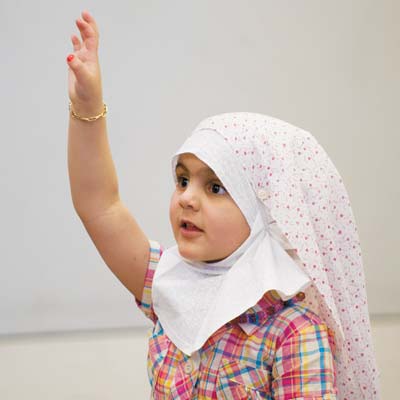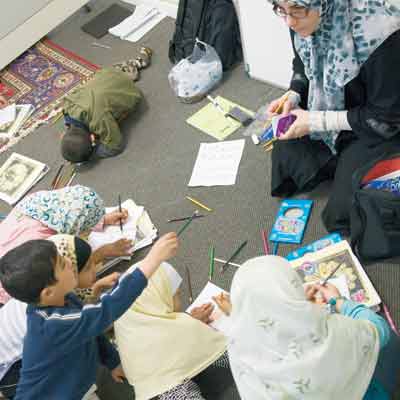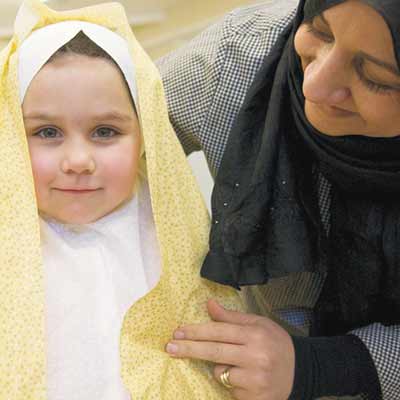They were seeking refuge, rest and a new home. Persecution and atrocities left behind, they settled here in the Salt Lake Valley after long, trial-filled journeys. How could this group of Mormon pioneers have known that their final stop in 1847 would make it possible for another group of people, so different from them, to share the same story more than 100 years later?

By 1999, after two international wars-one with Iran, the other with the United States-and nearly a decade of sanctions, Iraqis were left destitute. That same year, American and British forces began weekly, sometimes daily, air strikes on the country in an attempt to weaken what seemed to be the iron grip of Saddam Hussein. It was also the same year Thikra Mohammed and her husband decided it was time for their young family to leave their home and native country.
"We did not feel we were free," Thikra recounts."We could not talk. There was a lot of interruption and interference with our jobs as doctors. The situation got worse and worse in every aspect of life."
The couple, along with their infant daughter, left for Yemen.
"It was very tough and hard, difficult to explain to our families – leaving Iraq, leaving our profession….We don’t know where we are heading. So it is very difficult situation, but we thought about our kids and their future," Thikra explains.
Yemen, a country struggling with its own internal conflicts, was little improvement over the family’s situation in Iraq. The family moved again, this time to Jordan. There they were registered as refugees with the United Nations and told they were being relocated to another desert region, the state of Utah.
"Some people in the American Embassy in Jordan, they just gave us some advice, some information about the people in Utah. They say,’They are kind of religious.’ We just felt comfortable with that." Though Thikra says she was wary of the term Mormon. She had no idea what it meant, what it entailed. "We said that’s fine, maybe later, if we don’t like it we can change state. We can move to another state. But when we arrived here we just felt it was very nice and it is convenient for us as a family."
Mustafa, another Iraqi refugee who also fled the rule of Saddam, likened living under the dictator to an abusive husband. "He takes away all feeling of safety in the home, the most important place. The place you should always feel safe. That is what Saddam did. He took away safety in my country, my home."
In 1997, Mustafa left Iraq and came to Utah at the encouraging recommendation of a friend. He’s now passing along the advice.
"I think Utah is nice," he says. "I visit many states where Muslims are living. They think that it’s the best place for them, but my recommendation is to come to Utah. It’s a good place to raise children. You can protect them. Because it is a conservative state, you can shelter them from certain things."

Conservative is an understatement to some. The predominantly Republican state is also home to the headquarters of The Churchof Jesus Christ of Latter-day Saints. In 2004, an official estimate counted a little over 60% of Utah’s population as members of the Church.
Though they are not minarets, the steeples of Mormon churches and temples that pierce Utah’s skyline are evidence of the state’s religious atmosphere, something many Muslims find appealing.
"They focus on religion, like attending churches, mosque like us." Thikra emphasizes, "This is very important inlife."
The Mormon majority in Utah have created a state that reflects the religion in both laws and culture. It’s a phenomenon central to the complaints of the non-Mormon residents of the state, but as Muslims, Thikra, Mustafa and many other Iraqis share common religious restrictions and morals with Mormons.
Both Islam and Mormonism encourage their followers to abstain from alcohol, drugs and gambling. "I’d rather have a Mormon neighbor," says Khalid Al-Hamed, an Iraqi refugee from the province of Basra. "They don’t drink. They don’t smoke. You feel the same."
There is a strong emphasis on family, a value apparent in both church and day-to-day activities of both religions. The LDS church has established Welfare Square near downtown Salt Lake, an area dedicated solely to helping those in need. In Islam, charity is one of the five religious pillars of the faith.
It may seem an odd comparison to some, but to Daniel Peterson, a member of the LDS church and a professor of Islamic Studies and Arabic at Brigham Young University in Provo, it’s a phenomenon he’s observed for years.
"There is a large theological difference, of course, but not quite so far apart as people may guess. Theologically we speak the same language," Peterson says.
Peterson also says he’s not surprised to hear that Muslims in Utah are finding the "moral climate" in Utah to their liking. It’s a sentiment he hears echoed from his own Muslim friends and acquaintances. He says quite often, diplomats from Muslim countries visiting BYU are pleased to find an American university that has not become as liberal as most. Because the University has a strict honor code and requires its Mormon students to closely follow LDS standards, diplomats often send their children to the campus. "They can receive an American education in an atmosphere that more closely resembles the one in which their parents were educated back in the ’50s or ’60s," Peterson explains.

Internationally, the Church of Jesus Christ of Latter-day Saints donates more money to Islamic Relief Worldwide than any other church. The LDS church donated $1.6 million in aid to tsunami victims; Peterson says itis easier for the church to donate to an established charity with ties and links to a community that would be hard for a Christian church in a Muslim country to establish.
This tie fueled fire behind a Boston Globe article earlier this year alleging that former Republican presidential candidate Mitt Romney was a member of a church that funded terrorism. The article alleged some of the money donated was diverted to the Palestinian militant group Hamas. According to an official statement addressing the article from the church’s website, "All donations from the Church to Islamic Relief Worldwide have been in the form of relief items such as clothing, quilts, disposable diapers, infant formula, wheelchairs, washcloths, soap and first aid supplies. In each case, representatives of the Church accompanied the shipments and oversaw distribution."
The LDS church is also established in the Middle East.Though they are forbidden to proselytize, there are members in Jordan, Egypt, Saudi Arabia, Lebanon and Syria. "We do not actively seek out or target Muslim converts," Peterson says, though it is an ongoing discussion within the church. "We’re there to build relationships and friendships," he continues. "We certainly won’t deny that."
Nationally, bridges are also being built. Peterson is traveling to Claremont University in Southern California to speak at a Muslim-Mormon dialogue to address the on-going and future relationship between the two religions.
Here in Utah, the LDS church, as it has done with numerous other religions, offered to donate money to help Muslims build a mosque in the Salt Lake Valley. Peterson says the offer was declined.
Peterson also believes many Mormons may not be aware that their conservative atmosphere is benefiting others, especially their Muslim neighbors. The appreciation and recognition may also encourage more Mormons to make more of an effort learn about Islam.
"There is a lot of ignorance, but there a lot of interest in learning more. There is a hunger to understand," Peterson says.
A home and a place to worship
Before the service begins, there are warm greetings and inquiries of health and well-being, how children are doing in school, what solutions one can offer to another’s problem, general gossip. Everyone knows everyone else. Even when services start, children and babies continue to play happily, surrounded by friends and family. In this congregation, a child has not just one, but many, mothers.
It’s a scene many Latter-day Saints could relate to. However, it’s not Mormons, but Muslims, who are worshipping tonight.
A table is laid with numerous dishes of rice, stews and breads, dishes as familiar and traditional as green Jell-o and funeral potatoes are to Mormons, in preparation for a meal before the service.

Now the sheik will speak. Tonight, his sermon is about the media and the sometimes harmful stereotypes of Muslims that are often portrayed. "We should know what the American people think…," he continues, "this is one way to help understand, and therefore, prevent potential prejudices."
It’s just one of the ongoing struggles Iraqi refugees are facing. Another is citizenship.
Most are permanent residents, official refugees. They’ve taken their naturalization tests, passed, but citizenship still eludes them.The majority of Iraqis living in Utah were here before the 9-11 attacks. After that, however, the process slowed to a standstill. Many have taken their cases to court with the help of lawyers working for Catholic Community Services.
"Even after 10 years of living here, paying taxes and abiding by the law," says Mustafa who is still fighting for his citizenship.Thikra took her naturalization test in April 2005 and still waits for citizenship. "We have everything documented here," she says,"The government brought us here as legal refugees. We are permanent residents now. It’s just a matter of processing."
For Thikra, the pursuit of citizenship may force her to leave Utah. "If I apply for residency, I have to apply in different states. If I get any chance or opportunity in another state, I have to move. But I really love this state." If that is the case, Thikra is adamant about coming back. "Maybe if I finish residency, which is four years in a different state, I can move back again and work here as a doctor."
Still looking for refuge
Nearly every Iraqi in Utah, and the rest of the nation, has family still living in the war-torn country.
Mustafa went back to see his family in Karabala, a city that has made its fair share of headlines for violent clashes and bombings. He tells of limited electricity, rising gas prices, the way life has slowed to an excruciatingly slow pace. "I saw my country and I’m not optimistic about it," he shakes his head. "A term you hear repeatedly is ‘democracy,’ and we’ve seen that ‘democracy’ comes with a price."
Thikra and her husband lost numerous relatives in the violence that erupted after the fall of Saddam. "In the beginning it was hopeful, but now it is hopeless." Her voice waivers and she struggles to control her emotions as she talks of the despair and helplessness she feels knowing that her loved ones are suffering. "Every time I call my family they say, ‘We just have one wish in our life, to see you before we die, because we don’t know what may happen.’ It is very hard," she continues."They wish now they could leave Iraq."
And many do.
This month is the fifth anniversary of America’s 2003 invasion of Iraq. Backlash from the conflict has spilled outside Iraq’s borders into neighboring countries. There is a growing concern over the crisis brewing in countries like Syria, Egypt, and Jordan around the 2.5 million Iraqi refugees who have fled the ongoing violence in their homeland. Not since the displacement of the Palestinian people with the creation of Israel in 1948 has there been a refugee crisis this large in the Middle East.
Syria, after taking in one million Iraqi refugees, has effectively closed its borders, overwhelmed by the continuous flow. Jordan admitted more than 700,000 of the refugees before shutting down its border crossings. Egypt has taken in 100,000. The United States initially set a goal to allow 7,000 refugees into American borders over the last 12 months. The Bush Administration then lowered the goal to 2,000. As of the end of 2007, 1,608 Iraqis have been resettled in America.

The growing strain the refugees are creating in the Middle East is one America cannot afford to ignore. Not only is the reresentment from Iraqis, who risked their lives to help the U.S. in exchange for visas, but citizens of other Middle Eastern countries are now competing with the refugees for jobs and aid money.
Sooner or later, the U.S. will have to recognize that taking in a mere 2,000 of more than 2.5 million is not enough. As yet another group faces the struggles and hardships of making a home in a foreign land, the Salt Lake Valley, and other Mormon communities throughout the nation may prove helpful in the transition.
"I think Mormons and Muslims can become a model of how Muslim-Christian relations can work," Peterson says. "The best kinds of relationships are built by neighbors, having people over to dinner. Mormons tend to be good at that. It could be a model for a lot of people."
Stephanie Carter is a recent graduate of the University of Utah with a BA in communications and a minor in Middle Eastern Studies. Last summer she lived and blogged in Cairo. Her experiences with the LDS Church in the Middle East inspired this article.
